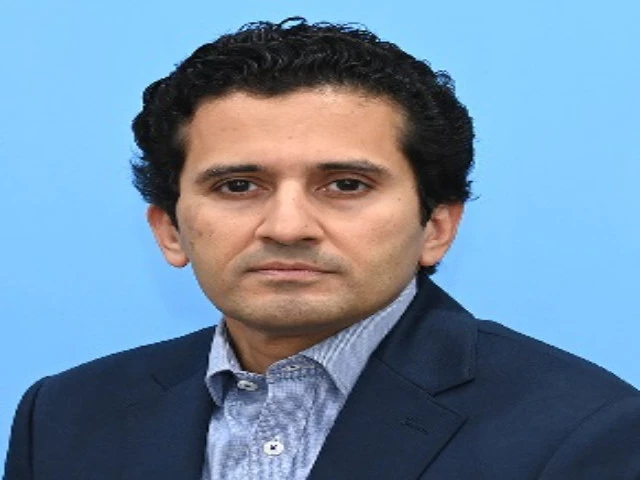Minister shrugs off industry fears
Downplays mass closure fears, says IMF-linked gas levy cannot be changed

Federal Minister for Energy (Petroleum Division) Ali Pervaiz Malik has downplayed the industry's criticism of the government's newly imposed gas levy, saying it is fully aligned with the conditions set by the International Monetary Fund (IMF).
Responding to The Express Tribune's query about business leaders' outcry over the levy, he said, "The matter is an eight-month-old event from February, and industry people were informed about it beforehand."
Regarding the mechanism alleged by industrialists to be flawed, Malik said it was well-designed and properly calculated in accordance with the IMF agreement, adding that it cannot be changed.
Fears of an impending industrial breakdown are growing, as leading industrialists warn that chronic energy mismanagement is pushing industries to the brink. Decades of underinvestment, volatile pricing and policy shortfalls, they argue, have left the sector fragile and unprepared for future shocks. Speaking to The Express Tribune, business leaders cautioned that without decisive intervention, key sectors could face shutdowns, job losses and a long-term erosion of manufacturing capacity. They warned that "time is running out to prevent a systemic collapse."
Jawed Bilwani, a prominent figure in Pakistan's textile sector and former president of the Karachi Chamber of Commerce and Industry (KCCI), voiced serious concerns over the worsening energy crisis, attributing it to decades of mismanagement and poor policymaking.
He said the country's initial gas reserves, once projected to last 100-150 years, were now nearly depleted due to indiscriminate allocation to CNG, IPPs and domestic consumers – despite being originally intended for industry. Bilwani criticised RLNG import agreements as heavily disadvantageous, noting that Pakistan faced penalties for not purchasing gas when prices were low but gained no benefit when global prices surged.
Highlighting soaring electricity costs, he pointed to capacity payments and the PHL charge – an additional surcharge on power bills to cover mark-up on loans taken by Power Holding Limited (PHL) to service circular debt – as key factors behind massive bills despite continued load-shedding and poor supply quality.
He also objected to the newly imposed levy on captive-power users, arguing that it aimed to make self-generation unviable while industries were already burdened by exorbitant tariffs and unreliable grid supply.
Bilwani recalled that when gas was discovered, "the whole world looked at us with envy." Experts, he said, predicted that the discovery would enable Pakistan to meet its industrial needs and become a strong economy.
"At that time, wood, furnace oil or coal were the fuels for boilers. Later, when electricity load-shedding started, we exporters met then-president Pervez Musharraf and asked, 'How can we export with so much load-shedding?' He said, 'Install your own generators; I will give you permission for captive power,'" Bilwani recounted.
Initially, only exporters were allowed to install captive power, but later other sectors followed and CNG stations were also established. "Now see, gas in Pakistan was supposed to last 100-150 years, but it has finished," he said.
He warned that rising financial pressures could force widespread factory closures, triggering mass unemployment, social unrest and potential anarchy. He also cited inefficiency, corruption, double taxation, high line losses, cross-subsidies and failure to extract gas from existing wells as deep-rooted issues worsening the crisis.
Another leading industrialist and newly elected KCCI president, Rehan Hanif, condemned the government's gas levy, saying it had "fallen upon industrialists like a bolt of lightning." He said the method used to calculate the levy was "completely incomprehensible," adding that even officials who prepared the bills appeared unaware of the formula behind it.
He warned that the consequences of this policy were dire. "When industrialists are forced to pay such heavy bills, they will incur substantial losses or, at best, fail to make any profit," he said. Factories may continue operations temporarily to fulfil existing orders, but "industrialists cannot continue to operate at a loss" and will ultimately be compelled to shut down or sell their units.
Hanif stressed that the threat extended beyond the immediate loss of exports. "If industries begin to close across the country, it will inevitably lead to mass unemployment, a breakdown of law and order, and widespread anarchy," he warned.
He urged the government to withdraw the levy without delay, calling it an "unjustified increase" that could cripple Pakistan's industrial sector.
When contacted, Oil and Gas Regulatory Authority (Ogra) spokesperson Imran Ghaznavi said policy decisions were taken by the federal government. "The gas levy has been imposed by the Government of Pakistan. Ogra has no role in its calculation, notification, imposition or recovery," he clarified.





1733130350-0/Untitled-design-(76)1733130350-0-208x130.webp)













COMMENTS
Comments are moderated and generally will be posted if they are on-topic and not abusive.
For more information, please see our Comments FAQ